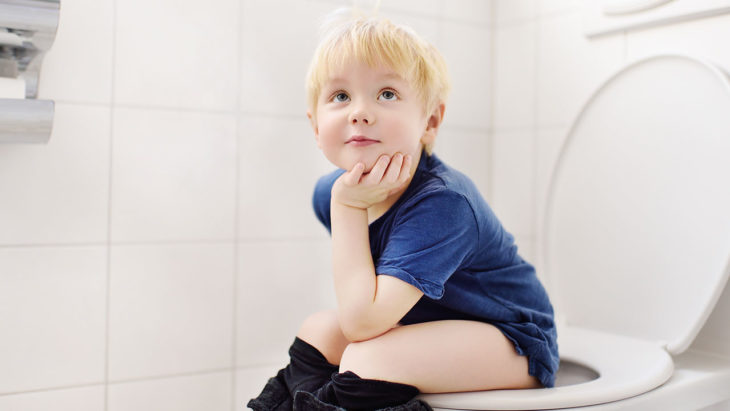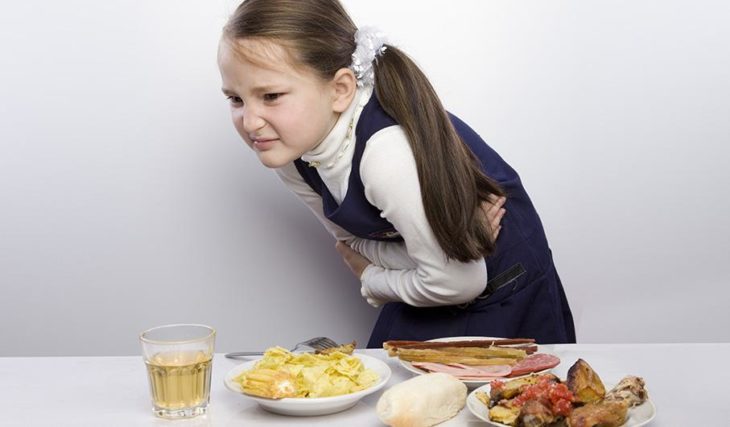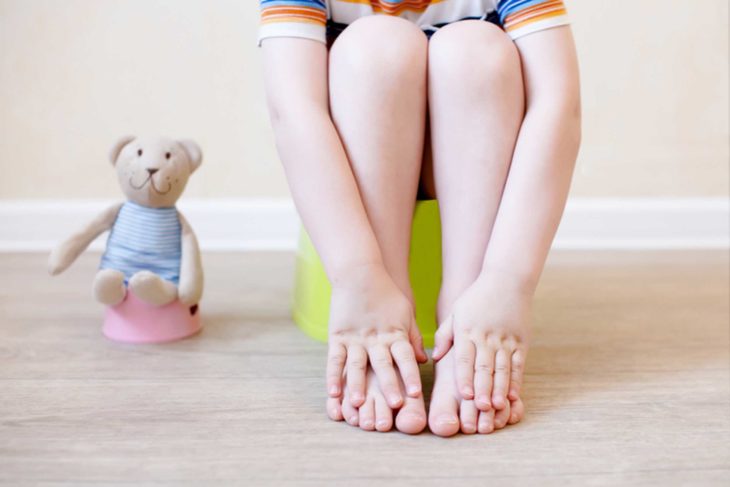Out of the various health problems, constipation is quite common. Constipated children have less than 3 bowel movements a week, or hard/dry stools.
Amongst common causes include improper toilet training or some changes in their diet. Luckily enough, constipation in children often turns out to be temporary.
You must encourage your kids to make a few simple dietary changes in their diet, such as eating more fruits, vegetables, and other fiber-rich foods, as these foods are great for digestion and are rich in nutrients, too.
In case your family doctor permits and based on your child’s current state, you may need to include laxatives in his/her diet.

Source: Raising Children Network
Contents
What are the symptoms?
The following are some common symptoms of constipation in children:
- Weekly bowel movements not more than 3
- Pain during a bowel movement
- Hard/dry stool that’s difficult to pass
- Stomach ache
- Hard stool with blood on the surface
In many cases, kids try to avoid bowel movements, as they fear pain. You may notice your child standing with his/her legs crossed, clenched his/her buttocks, and making faces in the meanwhile to hold stool.
When do you need to see a doctor?
While constipation in children isn’t serious quite often, you may need to take your child to a doctor if it lasts longer than two weeks and is accompanied by any of the following:
- Not eating
- Weight loss
- Fever
- Abdominal swelling
- Pain during a bowel movement
- Blood in the stool
- Rectal prolapse

Source: Nestlé NIDO
Causes of constipation in children
Constipation mostly occurs in the event when stool moves too slowly inside the digestive tract, which causes it to become dry and hard.
While there could be many factors contributing to constipation, the following are a few major ones that are common:
- Withholding
Children often ignore the urge to use the toilet either because they are afraid of the toilet or they don’t want a break from their playtime. Also, some kids try and usually withhold when they are away from home or not comfortable using public toilets.
- Improper toilet training
Many children do not like to start toilet training too soon and often hold in stool. Multiple such instances often lead to a battle of wills, and then voluntarily decide to ignore the urge to go to poop, which can quickly become a habit that’s hard to change.
- Diet changes
When your child’s everyday diet lacks enough fiber-rich vegetables and fruits or fluid, it may lead to constipation. One common scenario wherein usually become constipated is when they switch to a diet that contains solid foods from a liquid diet.
- Medications
In many children, certain drugs and some antidepressants often cause constipation.
- Cow milk allergy
Some children are allergic to cow’s milk or consume too much of the dairy products (cheese and cow’s milk) in their diet, which sometimes causes constipation.

Source: Reader’s Digest
Risk factors associated with constipation in children
Constipation in children, in today’s age and lifestyle, is often found in kids who have one or more of the following traits:
- Sedentary lifestyle
- Not drinking enough fluids
- Not eating enough fiber
- Having a medical condition that affects the rectum or anus
- Taking medications like some antidepressants
- Having a neurological disorder
Prevention of constipation in children
In order to prevent constipation in children, try the following at home or visit here:
- As mentioned above, a fiber-rich diet can help a child’s body form a soft and bulky stool. So, make sure you serve your child high-fiber foods more often, including fruits, beans, vegetables, and whole-grain cereals. Start by serving these foods in small quantities.
- Make sure to encourage your kids to drink plenty of water and other fluids.
- Teach your children to do physical activities to stay healthy and fit, as they help their body stimulate normal bowel function.
- Create a toilet routine for your kids. If required, you can also provide a footstool to help them sit comfortably on the toilet and easily release a stool.

Source: verywellfamily.com
Conclusion!
When it comes to good parenting, you need to reward your children’s efforts and not just the result, always. You can reward them with exciting color books that help them learn while playing. Always be friends with your kid, as you don’t want them to hide things for you.
